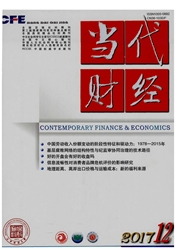

 中文摘要:
中文摘要:
近年来,地方政府财政状况恶化,中央政府转移支付又导致了低效率的公共支出。利用1996—2015年中国29个省级面板数据分析表明,预算软约束确实在一定程度上降低了地方政府的财政努力程度,特别是在新《预算法》以前,地方政府会因为有多余的财源而扩大支出,严重降低地方财政的努力程度;《预算法》的修订使得统筹分配税款有更明确、更公平的计算方式,降低了地方政府通过争取中央经费来提高公共支出的诱因,一定程度上减轻了预算软约束问题。因此,建议深入贯彻新《预算法》,发挥市场机制作用,利用社会支持的竞争和资本市场纪律来增强预算硬约束,消除政府间责任重叠现象,并对地方政府支出和借债进行严格的分级控制。
 英文摘要:
英文摘要:
In recent years, local governments are faced with fiscal deterioration, while the transfer payment of the central government has further led to inefficient public expenditures. This paper makes use of the panel data of China's 29 provinces during the period of 1996-2015 to conduct an analysis. The findings show that soft budget constraints have indeed reduced the financial efforts of the local governments to a certain extent. Especially before the new Budget Law, the local governments would expand their expenditures due to the excess revenue, which could seriously reduce the local financial efforts. The amendment of the Budget Law provides a clearer and fairer calculation method for the collection and distribution of tax money, which can reduce the inducement on the local governments to increase public expenditure by striving for funds from the central government, thus relieving soft budget constraint problem to a certain degree. Therefore, it is suggested that we should carry out and implement thoroughly the new Budget Law, give full play to the market mechanism, take advantage of the competition supported by the society and the capital market disciplines to enhance the hard budget constraints, remove the overlapping responsibilities between governments, and carry out strict classified control on local government expenditures and debts.
 同期刊论文项目
同期刊论文项目
 同项目期刊论文
同项目期刊论文
 期刊信息
期刊信息
